现在完成时和一般过去时专项练习
- 格式:doc
- 大小:60.50 KB
- 文档页数:4

一般过去时与现在完成时区别专题与练习一现在完成时1.现在完成时的构成现在完成时是由助动词have(has)+动词的过去分词构成。
助动词说明该谓语是属于现在时范围。
它和主语的人称、数要保持一致。
过去分词是主要的谓语动词,说明句子的意义。
2.现在完成时的用法现在完成时表示过去某时发生的行为对主语目前产生的影响。
即用过去发生的某个行为来说明现在的某种情况。
XXX.(现在的情况)I knew him in 1997.(过去的动作)We have known each other since 1997.现在完成时把过去的动作和现在联系起来并着眼于现在)1)表示动作发生在过去某个不确定的时间,但对现在留下了某种影响和结果。
常被just、already、yet等副词修饰。
如:Have you had lunch yet?Yes。
I have。
I've just had it.你(已经)吃午饭了吗?我刚刚吃过。
(现在我不饿了)2)透露表现从曩昔某一时辰入手下手一向连续到目前的举措或状况。
这个举措大概刚截止,大概仍旧在举行。
常带有for和since等透露表现一段工夫的状语。
如:He has taught here since 1981他自1981年就在这儿教书。
(大概还要连续教)I XXX her for four years.我有四年没见到她了。
3)表示说话前发生过一次或多次的动作,现在成为一种经验,一般译为汉语“过”,ice。
ever。
never。
three times等时间状语。
如:I have been to Beijing twice.我去过北京二次。
3.现在完成时的时间状语1)目前完成时属于目前时范围,故不克不及和曩昔的工夫状语连用。
如:yesterday,lastSunday,in1990,three years ago 等。
可是,在夸大举措产生的结果和影响时,能够和一些透露表现不肯定的工夫状语连用。
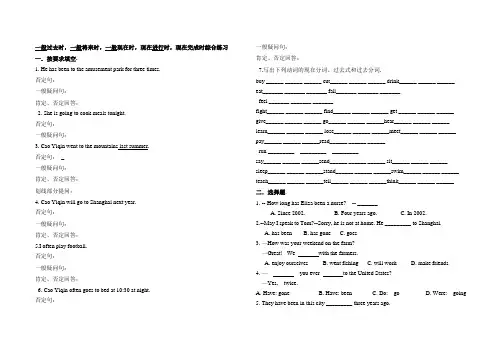
一般过去时,一般将来时,一般现在时,现在进行时,现在完成时综合练习一.按要求填空.1. He has been to the amusement park for three times.否定句:一般疑问句:肯定、否定回答:2. She is going to cook meals tonight.否定句:一般疑问句:3. Cao Yiqin went to the mountains last summer.否定句:_一般疑问句:肯定、否定回答:划线部分提问:4. Cao Yiqin will go to Shanghai next year.否定句:一般疑问句:肯定、否定回答:5.I often play football.否定句:一般疑问句:肯定、否定回答:6. Cao Yiqin often goes to bed at 10:30 at night.否定句:一般疑问句:肯定、否定回答:7.写出下列动词的现在分词、过去式和过去分词.buy ______ ______ ______ cut______ ______ ______ drink______ ______ ______eat_______ _______ _______ fall_______ _______ _______feel _______ _______ _______fight______ ______ ______ find______ ______ ______ get ______ ______ ______ give______ ______ ______ go______ ______ ______hear______ ______ ______learn______ ______ ______ lose______ ______ ______meet______ ______ ______ pay______ ______ ______read______ ______ ______run _________ _________ _________say______ ______ ______send______ ______ ______ sit______ ______ ______sleep______ ______ ______stand______ ______ ______swim______ ______ ______ teach______ ______ ______tell______ ______ ______think______ ______ ______ 二.选择题.1. -- How long has Eliza been a nurse? -- _______A. Since 2002.B. Four years ago.C. In 2002.2.--May I speak to Tom?--Sorry, he is not at home. He _________ to Shanghai.A. has beenB. has goneC. goes3. —How was your weekend on the farm?—Great! We with the farmers.A. enjoy ourselvesB. went fishingC. will workD. make friends4. —you ever to the United States?—Yes, twice.A. Have: goneB. Have: beenC. Do: goD. Were: going5. They have been in this city _________ three years ago.A. forB. aboutC. since6. ―have you been learning English?―I have been learning English for six years.A. How longB. How oftenC. How far7.--Where is Zhang Ming?-- Oh, he _____ to Beijng and he will be back tomorrow.A. has beenB. has goneC. goes8. The Greens____supper now. A:is having B:are;having C:is haveing9.____you usually _____to school with classmates?A. Do, comesB. does, comeC. Do, come10.Mr Green usually______newspapers after supper every day.A. readB. readingC. reads11.______Helen____________(wash )clothes? Yes ,she is .A. Is, washingB. Does , washC. Is, washes12. There ________ a dolphin show in the zoo tomorrow evening.A. wasB. is going to haveC. will haveD. is going to be13. He ________ her a beautiful hat on her next birthday.A. givesB. gaveC. will givingD. is going to giving14. There __________ a meeting tomorrow afternoon.A. will be going toB. will going to beC. is going to beD. will go to be 三.填空题.1.我母亲通常在星期日打扫卫生、洗衣服。
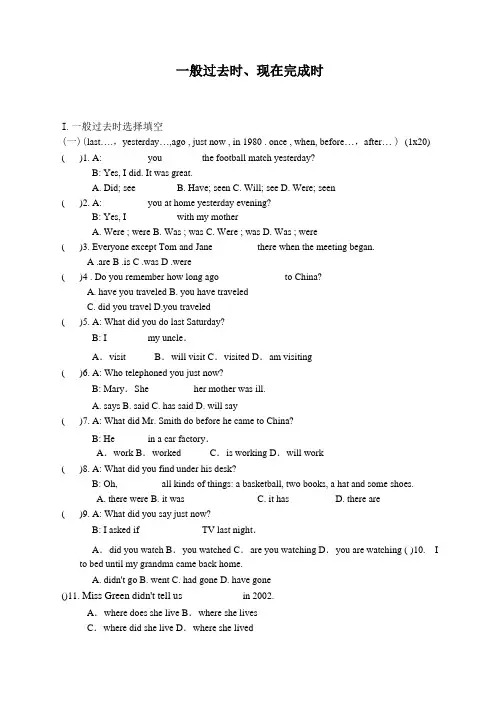
一般过去时、现在完成时I. 一般过去时选择填空(一)(last….,yesterday…,ago , just now , in 1980 . once , when, before…,after… ) (1x20) ( )1. A: ________ you ______ the football match yesterday?B: Yes, I did. It was great.A. Did; seeB. Have; seenC. Will; seeD. Were; seen( )2. A: ________ you at home yesterday evening?B: Yes, I _________ with my motherA. Were ; wereB. Was ; wasC. Were ; wasD. Was ; were( )3. Everyone except Tom and Jane ________ there when the meeting began.A .areB .isC .wasD .were( )4 . Do you remember how long ago ____________ to China?A. have you traveledB. you have traveledC. did you travelD.you traveled( )5. A: What did you do last Saturday?B: I _______ my uncle.A.visit B.will visit C.visited D.am visiting( )6. A: Who telephoned you just now?B: Mary.She ________ h er mother was ill.A. saysB. saidC. has saidD. will say( )7. A: What did Mr. Smith do before he came to China?B: He ______ in a car factory.A.work B.worked C.is working D.will work( )8. A: What did you find under his desk?B: Oh, ________ all kinds of things: a basketball, two books, a hat and some shoes.A. there wereB. it wasC. it hasD. there are( )9. A: What did you say just now?B: I asked if ____________ TV last night.A.did you watch B.you watched C.are you watching D.you are watching ( )10. I to bed until my grandma came back home.A. didn't goB. wentC. had goneD. have gone()11. Miss Green didn't tell us ___________ in 2002.A.where does she live B.where she livesC.where did she live D.where she lived( )12. I liked playing with water when I was young and ______ .A. so he wasB. so was heC. so did he.D. so he did( )13. A: Your city looks beautiful!B: Yes. Lots of trees and grass _______ last year.A. are plantedB. have plantedC. were plantingD. were planted( )14. The PLA ______ i n 1927.A. was found B .found C. was founded D. founded( )15. A: Did you win the basketball gameB: Bad luck. Our team _______ in the final one.A. wonB. beatC. was wonD. was beaten( )16. Miss Hyde _________ 20 dollars buying a new handbag last week.A. paidB. spentC. costD. took( )17. A: May I use your English-Chinese dictionary?B: Sorry, I it at home this morningA, forget B ,left C , have forgotten D , was leaving.( )18.The lost child was last seen __________ near the river an hour ago.A. playsB. playingC. playedD. play( )19. Uncle Li used ________ in this lake when he was a child.A. to swimmingB. for swimmingC. for the swimD. to swim( )20. A: Linda had nothing for breakfast this morning, ______ ?8:No. She got up too late.A. had sheB. hadn’t sheC. did sheD. didn’t sheII. 一般过去时选择填空(二)(词组,惯用法)(1x20)( )1. Last weekend, an English short play was ______ i n the school hall.A:put in B. put down C. put on D. put up( )2. A: People ______ g o to the markets to buy living chickens to eat, but now they have to change that habit.B:That’s true. But I think everything will be better.A. used toB. are used toC. use toD. are used ( )3. When he home, he saw his mother cleaning the room.A.got up B.got back C.got off D.got on( )4. It ______ me two hours to get there by bus.A. spentB. tookC. usedD. paid( )5. Tom _______ the nice kite to fly for 10yuan.A. paidB. boughtC. spentD. cost( )6. I bought a new dictionary and it __________ m e 30 yuan.A. paidB. spentC. tookD. cost( )7. A: What did you _____ j ust now?C:I ____you if you could follow me.A.say, toldB. speak, askedC. speak, saidD. say, asked( )8. The students put down their pens when the teacher ______ them to stop writing.A. saidB. spokeC. toldD. talked( )9. A: Why did you come back so late?B: Because my teacher made me ___________ a lot of exercises.A.do B.doing C.did D.done ( ____________________ )10. There was an important meeting last night. Mr Smith __________________________ to it.A. was invitedB. invitedC. is invitedD. invites( )11. We could see nothing because the lights suddenly _________ .A. went onB. went overC. went downD. went out( )12.The car _______ and stopped at the red traffic lights.A. got onB. got offC. slowed downD. picked up ( )13. The hen on the grass and four eggs last week.A. lied, layB. lay, layC. lay, laidD. lay, layed( )14. Who _______ the money from the old man in the street yesterday?A. robbedB. stoleC. caughtD. took( )15. A: Why di dn’t you buy any fruit on your way back?B: Sorry, I _________ t o take any money with me.A. rememberedB. affordedC. forgotD. stopped ( )16. In 1990 , the population of the world __________________________________________ f ive billion .A .got toB .arrived inC .arrived atD .reached( )17. A: May I ______ your bike?B: Sorry. I _____ it to Mary yesterday.A. keep; borrowedB. borrow; repairedC. use; lentD. lend; returned ( )18. A: Do you like a teacher?B.Sure. But my parents ___ me to be a doctor when I was a young girl.A. to be, hopedB. being, hopedC. being, wishedD. to be , wish ( )19. A: The robber didn’t tell the truth , did he?B: ______ . The police will have much trouble ________ the diamonds.A .No, he did. / to findB .Yes, he did./ findingC .No, he didn’t. /findingD .Yes , he didn’t. / to find ( _ )20. Mother asked the shopkeeper _____________________________ the trousers _______ too much .A. who ; costsB. what ; costC. if ; costD. whether ; will costm. 一般过去时用括号内的中文填空完成句子:(2xi0)1.It is about four years since I (来至U)to No.9 Middle School in Shashi.2.Everyone except Tom and John(至了)there when the meeting began.3.Our teacher told us the earth (转动)round the sun all the time.4.The little girl (才回家)she finished cleaning the classroom.5.What a nice bag! But she (花)only thirty dollars for it.6.Miss Li (没吃)lunch at school yesterday.7.Father (病倒了) after a whole week’s hard work .8.Our teacher, Miss Chen, (教英语)on the radio the day before yesterday.9.The classroom (打扫)yesterday .10.1(放)my dictionary on the desk, but it's missing now.W.现在完成时选择填空(一)(have /has + v. ed )(1x20)( )1. My mother the windows already, so the room looks much brighter.A.has cleanedB. had cleanedC. is cleaningD. will clean( )2. A:you your homework yet?B.Yes. I it a moment ago.A. Did; do; finishedB. Have; done; have finishedC. Have; done; finishedD. will; do; finish( )3. A: Why not go to see the dolphin show with me?B: No, let’s go home. Because I it twice .A. sawB. will seeC. see D, have seen ( )4. A: Have you written anything on Chinese traditional food so far?B:, but I have a plan for it.A. Ever sinceB. Later onC. Not yetD. From now on( )5. In the last few years, there great changes in the country.A .had beenB .wereC .have beenD .has been( )6. I don't think I you in that dress before.A. have seenB. was seeing C saw D. see( )7. So far many man-made satellites into space.A. are being sent upB. have been sent upC. have sent upD. have being sent up( )8. A: Tom, can I borrow your book Chicken Soapy.B: Sorry, I it to Mary.A. lentB. have lentC. had lentD. lend()9. A: Where is my handbag?B: Maybe you have it in the shoe shop.A. gotB. forgottenC. thrownD. left( )10. A: I can’t find my pen. _________ y ou ________ it anywhere, Mum?B: No. Look! What’s that under your book?A. Have; seenB. Do; seeC. Did; seeD. Had; seen( )11. A: You have never been to the West Lake, _________ you?B: No, never.A. doB. didC. willD. have( )12. A: I haven’t seen a film this year.B: ____ . It is two years since I saw the last film.A .So do IB .Neither do IC .Neither have ID .So have I( )13. I'm sorry you can't go in now. The room ___________ yet.A. hasn't been cleanedB. hasn't cleanedC. isn't been cleanedD. isn't being cleaned( )14. Mrs White _____ in this school since she came here .A. teachesB. taughtC. has taughtD. had taught( )15.The Smiths ________ lived here for ________ .A. has; sometimesB. have; some timeC. has; sometimeD. have; sometime( )16. A: Where is my sister, mum? I haven't seen her this morning.B: She _________ to the library.A.has been B.is going C.has gone D.will go( )17. Mr Li___ England. He _____ London for two weeks.A. has been to, has been toB. has gone to, has been inC. has been to, has been inD. has gone to, has been to( )18. A: Where have you been?B: I’ve ________ a paper factory.A. goneB. beenC. gone toD. been to( )19. Jim hasn't been to Australia _______ , but he has _______ been to China. He has _____ returned from Beijing.A. already; yet; justB. yet; never; alreadyC. never; ever; alreadyD. yet; already; just( )20. Miss Smith with her parents _______ China since _______ .A. have been in, two years agoB. has gone to, three yearsC. have been to, two yearsD. has been in, three years agoV.现在完成时选择填空(二)(for… since ….have been to /have gone to /have been in /at ) (1x20) ( )1. Andy has for five years. Five years ____ a long time.A. come back home, isB. come back home, areC. been at home, isD. been at home, are( )2. Her son speaks good English as he ________ America for five years.A. has been inB. has been toC. has gone atD. has gone to ( )3. A: I’m sorry to have kept you waiting.B: Oh, not at all. I _______ here for only a few minutes.A. will beB. wasC. amD. have been( )4. I must return the camera to Li Lei. I __________ it for two weeks.A. keepB. borrowedC. have keptD. have lent( )5. The factory has been ________ for two years.A. openB. to openC. openingD. opened( )6. A: Sorry .I am late.B: It doesn’t matter. The meeting ______ for just several minutesA. has begunB. has startedC. has been onD. had been on ( )7. The man in 1992, Hefor ten years.A. died, was deadB. died, has been deadC. was dead, has diesD. was dead, has been died( )8.The students are sorry to hear that the famous singer ________ for half an hour.A. has leftB. has goneC. has been awayD. has gone away( )9. A: Have you ever been anywhere for a tripB: A trip? I ____ away from my hometown even once.A. wentB. have goneC. have never beenD. have been()10. A: What a nice bike! How long you it?B: Just two weeks.A.will; buy B.did; buy C.are; having D.have; had( )11. A: How long ____ you _____ a cold?B: Ever since last night.A. have , gotB. have , hadC. have , caughtD. did , have ( )12.She Mr. White for two years.A. has marriedB. has married toC. has been married withD. has been married to( )13. A: Nice to see you. I _________ you for a long time.B: I _____ i n Beijing. I’ve just come back.A. hadn’t seen;amB. haven’t seen;wasC. didn’t see;will beD. haven’t seen;shall be( )14. How long have you ________ your parents?A. heard fromB. got the letter fromC. had the letter fromD. received the letter from( )15. A: Do you know Jack well?B: Certainly. We ______ friends for about ten years.A. wereB. have beenC. have becomeD. have made( )16. Lily with her parents ________ t he Greener China since two years ago.A. have joinedB. has joinedC. has been inD. have been in( )17. A: ________ have you been a green volunteer?B: For more than three years.A. How oftenB. How longC. How soonD. How much( )18. A: How long have you ______ t he football team of the school?B: About two years.A. been onB. been atC. joinedD. played( )19. A: Let's go to the Great Wall next Sunday.B: We'd better not.We __________ t here three times.A.have been B.are going C.have gone D.Will go( )20. Not only his parents but also his brother ____________ to the Summer Palace. They haven't been back.A. have beenB. have goneC. has beenD. has goneW.现在完成时句子改错:(2x10)1.I don’t think he’s ever been to the Monkey Island, isn’t he? _____2.I have heard of Hong Kong a lot, but I’ve never been to there. ______3.Bill has left Russia for two years. ______4.The traveler has come here for a week. _______5.How soon have you been at this school? ______6.No one but his parents have gone out for shopping. ________7.Since then there is great changes in our country. _______8.We haven’t seen Mr Smith for last month. _______9.Oh, Jim. How nice to meet you! I haven’t seen you since a long time10.I bought the pen a month ago, and I have bought it for a month already.________。
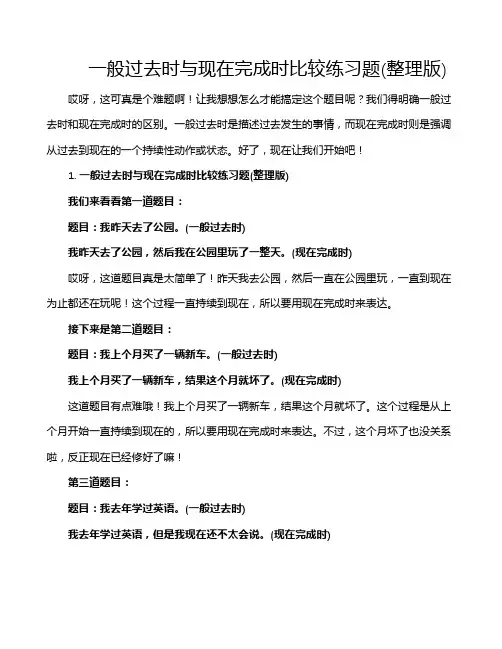
一般过去时与现在完成时比较练习题(整理版) 哎呀,这可真是个难题啊!让我想想怎么才能搞定这个题目呢?我们得明确一般过去时和现在完成时的区别。
一般过去时是描述过去发生的事情,而现在完成时则是强调从过去到现在的一个持续性动作或状态。
好了,现在让我们开始吧!1. 一般过去时与现在完成时比较练习题(整理版)我们来看看第一道题目:题目:我昨天去了公园。
(一般过去时)我昨天去了公园,然后我在公园里玩了一整天。
(现在完成时)哎呀,这道题目真是太简单了!昨天我去公园,然后一直在公园里玩,一直到现在为止都还在玩呢!这个过程一直持续到现在,所以要用现在完成时来表达。
接下来是第二道题目:题目:我上个月买了一辆新车。
(一般过去时)我上个月买了一辆新车,结果这个月就坏了。
(现在完成时)这道题目有点难哦!我上个月买了一辆新车,结果这个月就坏了。
这个过程是从上个月开始一直持续到现在的,所以要用现在完成时来表达。
不过,这个月坏了也没关系啦,反正现在已经修好了嘛!第三道题目:题目:我去年学过英语。
(一般过去时)我去年学过英语,但是我现在还不太会说。
(现在完成时)这道题目也很简单啊!我去年学过英语,但是现在还是不太会说。
这个过程是从去年开始一直持续到现在的,所以要用现在完成时来表达。
不过没关系啦,反正我现在正在努力学习嘛!第四道题目:题目:我小时候喜欢吃巧克力。
(一般过去时)我小时候喜欢吃巧克力,现在还是很喜欢。
(现在完成时)这道题目也很简单啊!我小时候喜欢吃巧克力,现在还是很喜欢。
这个过程是从小时候开始一直持续到现在的,所以要用现在完成时来表达。
不过没关系啦,反正我现在还是很喜欢吃巧克力嘛!第五道题目:题目:我上学的时候经常迟到。
(一般过去时)我上学的时候经常迟到,但是现在已经改正了。
(现在完成时)这道题目也很简单啊!我上学的时候经常迟到,但是现在已经改正了。
这个过程是从上学的时候开始一直持续到现在的,所以要用现在完成时来表达。
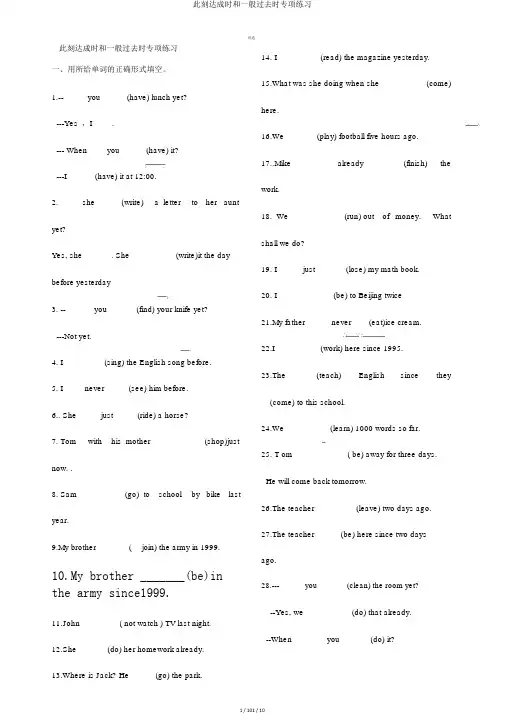
优选此刻达成时和一般过去时专项练习14. I _________ (read) the magazine yesterday.一、用所给单词的正确形式填空。
15.What was she doing when she __ (come) 1.--_____ you _____ (have) lunch yet?here.---Yes ,I .16.We_______ (play) football five hours ago.--- When____ you _____ (have) it?17..Mike ______ already ______(finish) the ---I______ (have) it at 12:00.work.2._____ she _____(write) a letter to her aunt18. We ___________(run) out of money. What yet?shall we do?Yes, she_____ . She__________ (write)it the day19. I _____ just ______ (lose) my math book.before yesterday20. I ___ _ (be) to Beijing twice3. --______ you____ (find) your knife yet?21.My father _____ never____(eat)ice cream.---Not yet.22.I __________(work) here since 1995.4. I _________(sing) the English song before.23.The_______(teach) English since they 5. I ____ never _____(see) him before.(come) to this school.6.. She_____ just _____(ride) a horse?24.We __________(learn) 1000 words so far.7. Tom with his mother _________(shop)just25. T om ____________( be) away for three days. now. .He will come back tomorrow.8. Sam ________ (go) to school by bike last26.The teacher _________(leave) two days ago. year.27.The teacher______(be) here since two days9.My brother _______( join) the army in 1999.ago.10.My brother _______(be)in the army since1999.11.John_________( not watch ) TV last night.12.She ______ (do) her homework already.13.Where is Jack? He______(go) the park. 28.--- _____ you ______ (clean) the room yet?--Yes, we __________ (do) that already. --When _______ you ______ (do) it?-可编写 ----We _______ (do) it an hour ago.29. ---______ he ______ (see) this film yet?--Yes,he _____.--When _____ he _____ (see) it?--He ____ it last week.30. I _________ (read) the book twice. It’ s interesting.31 — Where ’ s she?.-- She ________ (go) to Pairs.--How ______she ______(go) there?--She _______ (go) there by air.32. So far, many countries ____ (improve) their environment.33. Mr Chen _____(give)up smoking lastyear.34.Mr Chen ______ (give) up smokingsince last year.35.It ’s ten years since I ________(meet) her.36.This is the most interesting bookthat I_________(read).37.She _________(work) in this hospital in2005.38.She _________(work) in this hospital since2005.39.I __________ (clean) my room two hoursago.40.I ________(clean) my room since two hoursago.41 The old men ____________ (live)in the housefor ten years.42.Mum is not at home now. She _______(go) the shop.43.The sun ________(rise) since five o’clock.44.I ’ m sorry I ’ ve already_______(forget) your name.45.My leg _______(hurt) a lot last night.46.They ________(eat) a lot of chichen already.47.--- he ______ (give) the book back to the library?--Not yet.48.My uncle _______(teach) English for ten years. He loves his job.49.I ________(spend) five hours watching TV last weekend.50.He ’s just _______(tell) us a story.二、按要求变换句型。
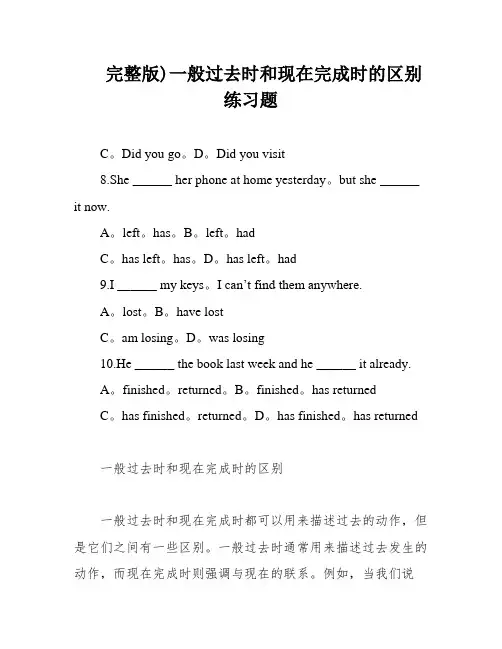
完整版)一般过去时和现在完成时的区别练习题C。
Did you go。
D。
Did you visit8.She ______ her phone at home yesterday。
but she ______ it now.A。
left。
has。
B。
left。
hadC。
has left。
has。
D。
has left。
had9.I ______ my keys。
I can’t find them anywhere.A。
lost。
B。
have lostC。
am losing。
D。
was losing10.He ______ the book last week and he ______ it already.A。
finished。
returned。
B。
finished。
has returnedC。
has finished。
returned。
D。
has finished。
has returned 一般过去时和现在完成时的区别一般过去时和现在完成时都可以用来描述过去的动作,但是它们之间有一些区别。
一般过去时通常用来描述过去发生的动作,而现在完成时则强调与现在的联系。
例如,当我们说“我去年去了北京”时,我们使用的是一般过去时,因为这个动作发生在过去。
但是,如果我们说“我去过北京”,我们使用的是现在完成时,因为这个动作与现在有联系,可能是我们最近去过北京或者我们曾经去过北京但是现在不再去了。
单项填空。
1.- 对不起,XXX,我借了你的收音机很长时间了。
- 没关系。
A。
借了。
B。
借出C。
保留。
D。
归还2.- 最近你去哪里了。
- 我和朋友去了扬州。
A。
去了,去了。
B。
去了,在那里C。
去了,来了。
D。
去了,回来了3.- 你父亲在哪里?我们已经好几周没见了。
- 他去美国了。
A。
他去了美国。
B。
他去了英国C。
他要去澳大利亚。
D。
他要去看我的祖父母4.自从工厂开业以来,他们一直在这里工作。
A。
离开了学校。
B。
加入了团队C。
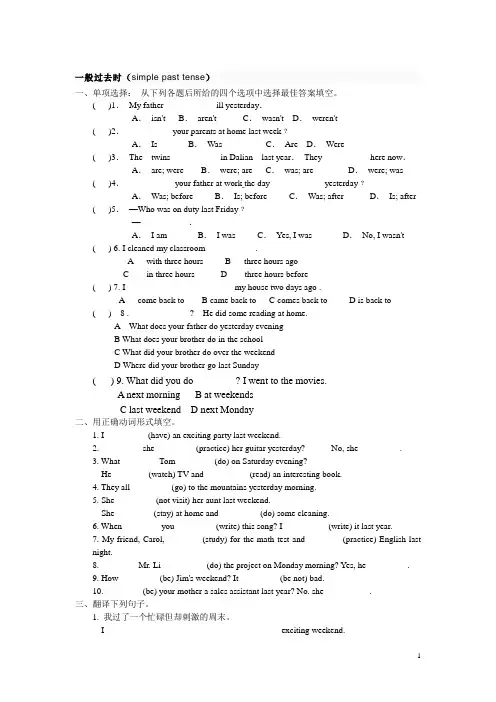
一般过去时(simple past tense)一、单项选择:从下列各题后所给的四个选项中选择最佳答案填空。
( )1.My father ___________ ill yesterday.A.isn't B.aren't C.wasn't D.weren't( )2.___________your parents at home last week﹖A.Is B.Was C.Are D.Were( )3.The twins ___________in Dalian last year.They __________ here now.A.are; were B.were; are C.was; are D.were; was ( )4.___________ your father at work the day __________ yesterday﹖A.Was; before B.Is; before C.Was; after D.Is; after ( )5.—Who was on duty last Friday﹖—___________.A.I am B.I was C.Yes, I was D.No, I wasn't ( ) 6. I cleaned my classroom ___________.A with three hoursB three hours agoC in three hoursD three hours before( ) 7. I ________ _______ ________ my house two days ago .A come back toB came back toC comes back toD is back to( ) 8 . ___________? He did some reading at home.A What does your father do yesterday eveningB What does your brother do in the schoolC What did your brother do over the weekendD Where did your brother go last Sunday( ) 9. What did you do ________? I went to the movies.A next morningB at weekendsC last weekendD next Monday二、用正确动词形式填空。
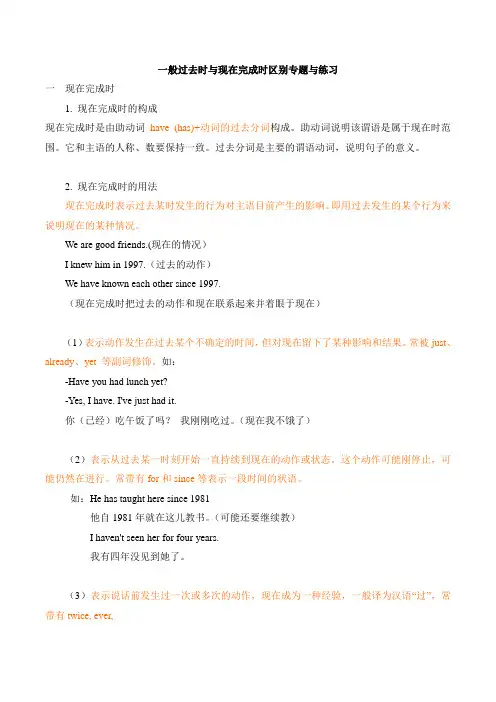
一般过去时与现在完成时区别专题与练习一现在完成时1. 现在完成时的构成现在完成时是由助动词have (has)+动词的过去分词构成。
助动词说明该谓语是属于现在时范围。
它和主语的人称、数要保持一致。
过去分词是主要的谓语动词,说明句子的意义。
2. 现在完成时的用法现在完成时表示过去某时发生的行为对主语目前产生的影响。
即用过去发生的某个行为来说明现在的某种情况。
We are good friends.(现在的情况)I knew him in 1997.(过去的动作)We have known each other since 1997.(现在完成时把过去的动作和现在联系起来并着眼于现在)(1)表示动作发生在过去某个不确定的时间,但对现在留下了某种影响和结果。
常被just、already、yet 等副词修饰。
如:-Have you had lunch yet?-Yes, I have. I've just had it.你(已经)吃午饭了吗?我刚刚吃过。
(现在我不饿了)(2)表示从过去某一时刻开始一直持续到现在的动作或状态。
这个动作可能刚停止,可能仍然在进行。
常带有for和since等表示一段时间的状语。
如:He has taught here since 1981他自1981年就在这儿教书。
(可能还要继续教)I haven't seen her for four years.我有四年没见到她了。
(3)表示说话前发生过一次或多次的动作,现在成为一种经验,一般译为汉语“过”,常带有twice, ever,never, three times等时间状语。
如:I have been to Beijing twice.我去过北京二次。
3.现在完成时的时间状语(1)现在完成时属于现在时范围,故不能和过去的时间状语连用。
如:yesterday,last Sunday,in1990,three years ago等。
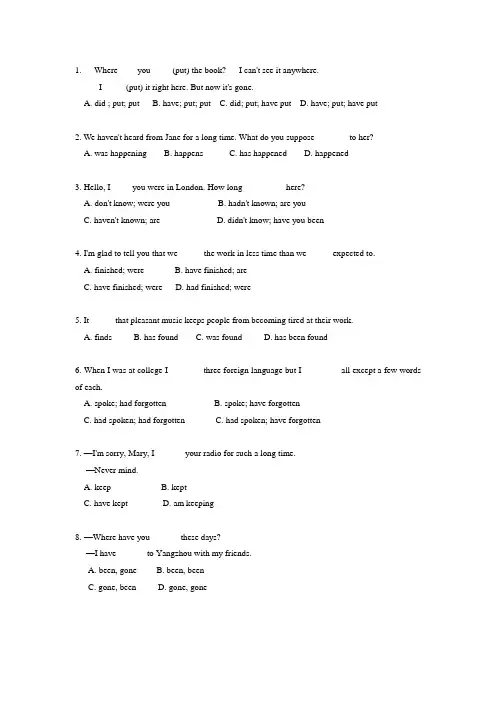
1. --- Where ____you ____ (put) the book? I can't see it anywhere.--- I _____(put) it right here. But now it's gone.A. did ; put; putB. have; put; putC. did; put; have putD. have; put; have put2. We haven't heard from Jane for a long time. What do you suppose _______ to her?A. was happeningB. happensC. has happenedD. happened3. Hello, I ____ you were in London. How long _________ here?A. don't know; were youB. hadn't known; are youC. haven't known; areD. didn't know; have you been4. I'm glad to tell you that we _____ the work in less time than we _____ expected to.A. finished; wereB. have finished; areC. have finished; wereD. had finished; were5. It _____ that pleasant music keeps people from becoming tired at their work.A. findsB. has foundC. was foundD. has been found6. When I was at college I _______ three foreign language but I ________ all except a few words of each.A. spoke; had forgottenB. spoke; have forgottenC. had spoken; had forgotten C. had spoken; have forgotten7. —I'm sorry, Mary, I ______ your radio for such a long time.—Never mind.A. keepB. keptC. have keptD. am keeping8.—Where have you ______ these days?—I have ______ to Yangzhou with my friends.A. been, goneB. been, beenC. gone, beenD. gone, gone9.—Where is your father? We haven't seen each other for weeks. —______.A. He has been to AmericaB. He has gone to EnglandC. He is going to AustraliaD. He would visit my grandparents10.They have ______ since the factory opened.A. left the schoolB. joined the teamC. become workersD. worked here11. Jim ______ the Great Wall many times.A. went toB. goes toC. has gone toD. has been to12.It ______ ten years since they ______ to France.A. was, movedB. was, have movedC. is, have movedD. is, moved13.—______ to the United States?—No, never, but I went to Canada a few years ago.A. Have you beenB. Have you goneC. Did you goD. Will you go14..I won't go to see the film tonight because I ______ my ticket.A. didn't loseB. have lostC. will loseD. didn't have15.Miss Wu has taught in this school ______.A. for ten yearsB. ten years agoC. since ten yearsD. for ten years ago16.I ______ today's homework already. What about you?A. have finishedB. finishC. to finishD. Finishing17. —Ann has gone to Shanghai. —So ______ her parents.A. hasB. hadC. didD. have。
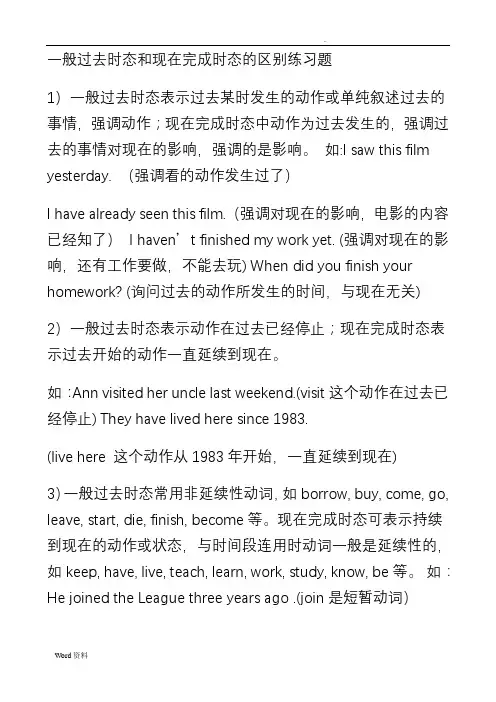
一般过去时态和现在完成时态的区别练习题1)一般过去时态表示过去某时发生的动作或单纯叙述过去的事情,强调动作;现在完成时态中动作为过去发生的,强调过去的事情对现在的影响,强调的是影响。
如:I saw this film yesterday. (强调看的动作发生过了)I have already seen this film.(强调对现在的影响,电影的内容已经知了)I haven’t finished my work yet. (强调对现在的影响,还有工作要做,不能去玩) When did you finish your homework? (询问过去的动作所发生的时间,与现在无关)2)一般过去时态表示动作在过去已经停止;现在完成时态表示过去开始的动作一直延续到现在。
如:Ann visited her uncle last weekend.(visit这个动作在过去已经停止) They have lived here since 1983.(live here 这个动作从1983年开始,一直延续到现在)3)一般过去时态常用非延续性动词,如borrow, buy, come, go, leave, start, die, finish, become等。
现在完成时态可表示持续到现在的动作或状态,与时间段连用时动词一般是延续性的,如keep, have, live, teach, learn, work, study, know, be等。
如:He joined the League three years ago .(join是短暂动词)He has been in the League for three years.(be in表状态,在团内的状态可延续)He has been a League member for three years. (是团员的状态可延续)4)一般过去时态常与具体的时间状语连用,而现在完成时态通常与模糊的时间状语连用,或无时间状语。
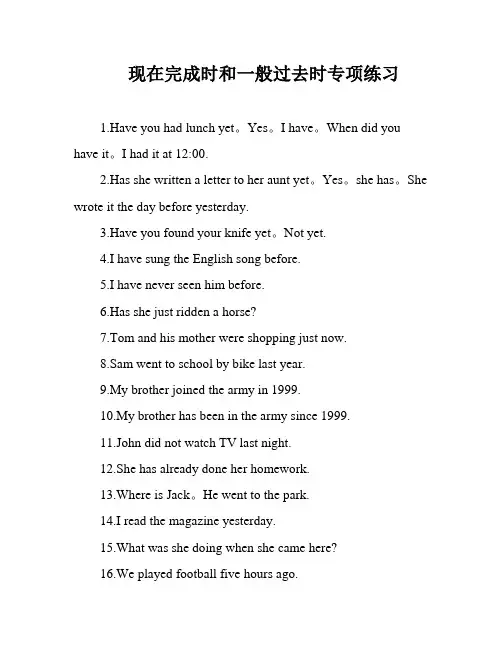
现在完成时和一般过去时专项练习1.Have you had lunch yet。
Yes。
I have。
When did you have it。
I had it at 12:00.2.Has she written a letter to her aunt yet。
Yes。
she has。
She wrote it the day before yesterday.3.Have you found your knife yet。
Not yet.4.I have sung the English song before.5.I have never seen him before.6.Has she just ridden a horse?7.Tom and his mother were shopping just now.8.Sam went to school by bike last year.9.My brother joined the army in 1999.10.My brother has been in the army since 1999.11.John did not watch TV last night.12.She has already done her homework.13.Where is Jack。
He went to the park.14.I read the magazine yesterday.15.What was she doing when she came here?16.We played football five hours ago.17.Mike has already finished the work.18.We have run out of money。
What shall we do?19.I have just lost my math book.20.I have been to Beijing twice.21.My father has never eaten ice cream.22.I have worked here since 1995.23.The teachers have been teaching English since they came to this school.24.We have learned 1000 words so far.25.Tom has been away for three days。
小升初英语现在完成时与一般过去时对比练习题50题1.I ______ my homework yesterday.A.didB.have doneC.doD.does答案:A。
本题考查一般过去时,yesterday 是明显的一般过去时的标志词,所以选did。
2.I ______ my homework already.A.didB.have doneC.doD.does答案:B。
本题考查现在完成时,already 是现在完成时的标志词,所以选have done。
3.She ______ to the park last Sunday.A.wentB.has goneC.goD.goes答案:A。
last Sunday 表明是一般过去时,所以选went。
4.She ______ to the park several times this month.A.wentB.has goneC.goD.goes答案:B。
this month 以及several times 表明是现在完成时,强调过去发生的动作对现在的影响,所以选has gone。
5.He ______ football yesterday afternoon.A.playedB.has playedC.playD.plays答案:A。
yesterday afternoon 是一般过去时的标志词,所以选played。
6.He ______ football many times this year.A.playedB.has playedC.playD.plays答案:B。
this year 以及many times 表明是现在完成时,所以选has played。
7.They ______ a movie last week.A.sawB.have seenC.seeD.sees答案:A。
last week 是一般过去时的标志词,所以选saw。
现在完成时练习题一、单项选择。
1、Both his parents look sad . Maybe they _________what's happened to him.A. knewB. have knownC. must knowD.will know2、He has _______ been to Shanghai, has he ?A. alreadyB.neverC.everD. still3、Have you met Mr Li ______?A. justB. agoC.beforeD. a moment ago4、The famous writer _____ one new book in the past two year.A. is writingB.was writingC.wroteD.has written5、Miss Green isn't in the office . she_______ to the library.A.has goneB. wentC.will goD. has been6、Zhao Lan ______already ______in this school for two years.A. was ; studyingB. will ; studyC. has ; studiedD. are ; studying7、We ______ Xiao Li since she was a little girl.A. knowB. had knownC. have knownD. knew8、Harry Potter is a very nice film .I_______ it twice.A. will seeB. have seenC. sawD.see9、—These farmers have been to the United States.—Really ? When _____ there ?A. will they goB. did they goC. do they goD. have they gone10、Hurry up! The play __________ for ten minutes.A. has begunB. had begunC. has been onD. began二、句型转换。
六年级英语一般过去时与现在完成时对比练习题40题答案解析版1. I ______ my homework yesterday.A. finishB. finishedC. have finishedD. am finishing答案解析:B。
“yesterday”是一般过去时的标志词,所以要用过去式“finished”。
A 选项“finish”是一般现在时;C 选项“have finished”是现在完成时;D 选项“am finishing”是现在进行时。
2. They ______ to the park last week.A. goB. wentC. have goneD. are going答案解析:B。
“last week”表明是一般过去时,要用“went”。
A 选项“go”是一般现在时;C 选项“have gone”是现在完成时;D 选项“are going”是现在进行时表将来。
3. My sister ______ the room already.A. cleansB. cleanedC. has cleanedD. is cleaning答案解析:C。
“already”是现在完成时的标志词,要用“has cleaned”。
A 选项“cleans”是一般现在时;B 选项“cleaned”是一般过去时;D 选项“is cleaning”是现在进行时。
4. We ______ football just now.A. playB. playedC. have playedD. will play答案解析:B。
“just now”是一般过去时的时间状语,用“played”。
A 选项“play”是一般现在时;C 选项“have played”是现在完成时;D 选项“will play”是一般将来时。
5. He ______ never ______ to Beijing.A. has; beenB. was; beenC. did; goD. has; gone答案解析:A。
六年级英语一般过去时与现在完成时对比练习题40题(答案解析)1.I ______ my homework yesterday.A.finishedB.have finishedC.will finishD.am finishing答案解析:A。
“yesterday”是一般过去时的标志词,所以用“finished”。
B 选项“have finished”是现在完成时;C 选项“will finish”是一般将来时;D 选项“am finishing”是现在进行时。
2.She ______ to the park this morning.A.wentB.has goneC.goesD.will go答案解析:A。
“this morning”可以作为一般过去时的标志,所以用“went”。
B 选项“has gone”是现在完成时,表示去了还没回来;C 选项“goes”是一般现在时;D 选项“will go”是一般将来时。
3.We ______ a great time at the party last weekend.A.hadB.have hadC.will haveD.are having答案解析:A。
“last weekend”是一般过去时的标志词,所以用“had”。
B 选项“have had”是现在完成时;C 选项“will have”是一般将来时;D 选项“are having”是现在进行时。
4.They ______ the movie already.A.sawB.have seenC.will seeD.see答案解析:B。
“already”是现在完成时的标志词,所以用“have seen”。
A 选项“saw”是一般过去时;C 选项“will see”是一般将来时;D 选项“see”是一般现在时。
5.I ______ my room and it looks very clean now.A.cleanedB.have cleanedC.will cleanD.am cleaning答案解析:B。
现在完成时和一般过去时专项练习一、用所给单词的正确形式填空。
1.--_____ you _____ (have) lunch yet?---Yes,I .--- When____ you _____ (have) it?---I______ (have) it at 12:00.2._____ she _____(write) a letter to her aunt yet?Yes, she_____ . She__________ (write)it the day before yesterday3. --______ you____ (find) your knife yet?---Not yet.4. I _________(sing) the English song before.5. I ____ never _____(see) him before.6.. She_____ just _____(ride) a horse?7. Tom with his mother _________(shop)just now. .8. Sam ________ (go) to school by bike last year.9.My brother _______(join) the army in 1999.10.My brother _______(be)in the army since1999.11.John_________( not watch ) TV last night.12.She ______ (do) her homework already.13.Where is Jack? He______(go) the park. 14. I _________ (read) the magazine yesterday.15.What was she doing when she __ (come) here.16.We_______ (play) football five hours ago.17..Mike ______ already ______(finish) the work.18. We ___________(run) out of money. What shall we do?19. I _____ just ______ (lose) my math book.20. I ___ _ (be) to Beijing twice21.My father _____ never____(eat)ice cream.22.I __________(work) here since 1995.23.The_______(teach) English since they (come) to this school.24.We __________(learn) 1000 words so far.25. T om ____________( be) away for three days. He will come back tomorrow.26.The teacher _________(leave) two days ago.27.The teacher______(be) here since two days ago.28.--- _____ you ______ (clean) the room yet? --Yes, we __________ (do) that already.--When _______ you ______ (do) it?---We _______ (do) it an hour ago.29. ---______ he ______ (see) this film yet?--Yes,he _____.--When _____ he _____ (see) it?--He ____ it last week.30. I _________ (read) the book twice. It’s interesting.31—Where’s she?.-- She ________ (go) to Pairs.-- How ______she ______(go) there?--She _______ (go) there by air.32. So far, many countries ___ _ (improve) their environment.33. Mr Chen _____ (give)up smoking last year.34. Mr Chen ______ (give) up smoking since last year.35.It’s ten years since I ________(meet) her.36.This is the most interesting book thatI_________(read).37.She _________(work) in this hospital in 2005.38. She _________(work) in this hospital since2005.39.I __________ (clean) my room two hours ago.40. I ________(clean) my room since two hours ago.41 The old men ____________ (live)in the house for ten years.42. Mum is not at home now. She _______ (go) the shop.43.The sun ________(rise) since five o’clock.44.I’m sorry I’ve already_______(forget) your name.45.My leg _______(hurt) a lot last night.46.They ________(eat) a lot of chichen already.47.--- he ______ (give) the book back to the library?--Not yet.48.My uncle _______(teach) English for ten years. He loves his job.49.I ________(spend) five hours watching TV last weekend.50.He’s just _______(tell) us a story.二、按要求变换句型。
彭老师家教中心学习资料之一般过去式和现在完成时专项练习主讲教师:Alex 彭一、现在完成时构成1.肯定句:主语+have/has+过去分词+(其他)。
11.否定句:主语+have/has+not +过去分词+(其他)。
12.一般疑问句Have/has+主语+过去分词?Yes, S+have/has.No, S+have/hasn’t.二、特征词already(肯定句)yet(否定句和疑问句)never,ever(疑问句)just (谓语动词之前) before(句末)so far= up to now, by now(到如今,迄今为止)in the past/last few years,(过去几年来)these days(这几天)since/ever since(自从,从那时起)for+ 时间段:for two years三、用法1.表示过去发生的某一动作对现在造成的影响或结果。
I have already seen the film.我已经看过这部电影了。
(还记得内容)Jim has just lost his book.吉姆刚才把书丢了。
(还没找到)2.常和表示从过去某一时刻延续到现在的一段时间的状语连用.如:for+时间段for12 weeks/three minutessince+ 时间点(起点)since 9 o'clock this morningsince+一段时间+ago=for+时间段;since two weeks ago=for two weeksfor a year=since a year ago;since 2000=for 9 yearssince+从句(从句常用一般过去时)The Greens have lived in Macao since they moved to Macao from Paris.格林一家从巴黎搬到澳门之后就一直住在澳门。
四、现在完成时与一般过去时的区别现在完成时与一般过去时都表示“动作已经发生”,但不同点在于:13.现在完成时强调这一动作与现在的关系,即对现在产生的结果、影响等,而一般过去时只表示过去的事实,不表示和现在的关系。
He has learned French for three years.他学法语已经三年了。
He learned French for three years.他曾经学过三年法语。
Who has taken my bag? I couldn't find it.谁拿走了我的包?我找不到了?He cleaned the house yesterday.他昨天打扫过房间。
The room is clean, for he has cleaned it already.房间很干净,因为他已经打扫过了。
14.现在完成时不可与表示过去的时间副词连用,而一般过去时则可以。
He has done some washing yesterday.He did some washing yesterday.他昨天洗衣服了。
五、时态填空:1.Are you sure you _______________(lose) the book?----Yes, I ___________(look) for it everywhere, but I still can’t find it.2.We ___________ already ___________(copy) these words.3. Jim _______________(just, watch) a football match. He is so tired and hungry.4. ___________you ever _____________(travel) on a train?5. ---______ they _______(see) the film yet?---Yes.They_____________(see) it already.----When______they______(see) it? ----They _______(see)it just now.6.---- ________ her sister ____________(be) to Nanning?----No,she_________( never,be) there before.六、现在完成时与一般过去时练习1. --- Where __you __ (put) the book? I can’t see it anywhere.--- I ___(put) it right here. But now it’s gone.A. did ; put; putB. have; put; putC. did; put; have putD. have; put; have put2. We haven’t heard from Jane for a long time. What do you suppose _______ to her?A. was happeningB. happensC. has happenedD. happened3. Hello, I ____ you were in London. How long _________ here?A. don’t know; were youB. hadn’t known; are youC. haven’t known; areD. didn’t know; have you been4. I’m glad to tell you that we _____ the work in less time than we _____ expected to.A. finished; wereB. have finished; areC. have finished; wereD. had finished; were5. It _____ that pleasant music keeps people from becoming tired at their work.A. findsB. has foundC. was foundD. has been found6. When I was at college I _______ three foreign language but I ________ all except a few words of each.A. spoke; had forgottenB. spoke; have forgottenC. had spoken; had forgotten C. had spoken; have forgotten7. —I’m sorry, Mary, I ______ your radio for such a long time. —Never mind.A. keepB. keptC. have keptD. am keeping10.—Where have you ______ these days?—I have ______ to Yangzhou with my friends.A. been, goneB. been, beenC. gone, beenD. gone, gone11.—Where is your father? We haven’t seen each other for weeks.—______.A. He has been to AmericaB. He has gone to EnglandC. He is going to AustraliaD. He would visit my grandparents12.They have ______ since the factory opened.A. left the schoolB. joined the teamC. become workersD. worked here11. Jim ______ the Great Wall many times.A. went toB. goes toC. has gone toD. has been to7.It ______ ten years since they ______ to France.A. was, movedB. was, have movedC. is, have movedD. is, moved8.—______ to the United States?—No, never, but I went to Canada a few years ago.A. Have you beenB. Have you goneC. Did you goD. Will you go9..I won’t go to see the film tonight because I ______ my ticket.A. didn’t loseB. have lostC. will loseD. didn’t have10.Miss Wu has taught in this school ______.A. for ten yearsB. ten years agoC. since ten yearsD. for ten years ago11.I ______ today’s homework already. What about you?A. have finishedB. finishC. to finishD. Finishing12.17. —Ann has gone to Shanghai. —So ______ her parents.A. hasB. hadC. didD. have七,用所给动词的适当形式填空。
1. With the medicine box under her arm, Miss Zhao (hurry) off to look after the man.2. Jim (make) many friends since he (come) to China.3. They ______(know) each other for about ten years.4. He ______ already ______(write) a letter to the factory to ask them to stop making noise.5. —When ______ she ______(leave)?—Two hours ago.6. —______ you ______(see) the film before?—Yes, I ______.—Where ______ you ______(see) it?—At The Qu een’s Cinema.7. —Thank you all the same, Mr. Black, but I don’t eat sweets.—Oh, I am sorry. I ______(not know) that.8. They usually ______(go) fishing when they lived there.9. How long ______ she ______(be) ill?10. They didn’t start to work in the field until the rain ______(stop).八,选择填空1.Mother __ __me a new coat yesterday. I _______ it on. It fits me well.A. had made…have triedB. made…have triedC. has made…triedD. made…tried2 “He ____to draw horses already”. “When ______ he ?” “ Last year “A. learned...has B. learned...did C. has learned...has D. has learned (i)3.Tom _____up into the tree. Look, he ____ high up there !A. has got…isB. has climbed…wasC. got …wasD. climbed…is4.____ you _____ the text yet ? Yes, we ____ it two hours ago.A. Did…copy…didB. Have…copied…haveC. Have…copied…didD. Did …copy…had5. “Why ______ she _______ angry ?” “Because he _____ at her just now .”A. did…get…shoutedB. has…got…shoutedC. did…get…has shoutedD. has…got…h as shouted6. ______you __________ the film before ? Where _____ you ____ it ?A. Have …seen…did…seeB. Did …see…did…watchC. Have…seen…have…seenD. Did …see…have…seen7.You ____ me waiting for two hours. I ____ for you since five.A. kept…wait edB. have kept…waitedC. kept…have waitedD. have kept…have waited8.Where ______ John _______ ? To the library. He _________ there for an hour.A.has…been…has goneB. has…gone…has beenC. did…go…wentD. did…be…went9.______ the baby still _____ ? No, it _______ crying.A. Has…cried…has stoppedB. Is…crying…stoppedC. Did …cry…stoppedD. Is…crying…has stopped10. I _______ the way. I ________ here for quite many years.A. knew...have lived B. knew...live C. know...have lived D. know (iv)11. _____ you ever _____ America ? Yes, I have.A. Have…gone toB. Have…gone inC. Have…been toD. Have …been in12. My brother ____college for over three years.A. has gone toB. has been toC. has been inD. has been at13.He ________ the Army by the end of 1989. He ______ in the army since then.A. joined…isB. has joined…has beenC. had joined…isD. had joined …has been14. By the time I _____ back they ____ up ten satellites.A. came…have sentB. came…had sentC. come…have sentD. had come…sent15. Jack ____ over five lessons by seven o’clock. Then he ____ a rest.A. went…tookB. went…had takenC. had gone…tookD. had gone…had taken16. We ____ out by that time that he ____ a spy for a long time.A. had found…had beenB. had found…wasC. found…had beenD. found…was17. Before the news ____ him, he ____ to know about it.A. reaches…has gotB. reached…had gotC. reached…gotD. had reached…got18. I _____ him a second letter before I ____ from him.A. wrote…heardB. wrote…had heardC. had written…heardD. have written…hear19. People ____ that the soldiers _____ fighting.A. say…had stoppedB. said…has stoppedC. say…stoppedD. said…had stopped20. We ____ in a good harvest because we ____ enough rain.A. didn’t get…had hadB. got…had hadC. had got…had hadD. got…hadn’t had21. They _______ for five hours when they ______ in New York.A. flew…arrivedB. had flown…had arrivedC. flew…had arrivedD. had flown…arrived22. She ____ that it _____ for two days by that day.A. says…has rainedB. says…had rainedC. said…had rainedD. said…rained23. John _____ there since the year before, so he _____ them.A. had worked…knewB. had worke d…had knownC. worked…knewD. worked…had known24. He _____ angry because he ____ for a long time.A. had got…had waitedB. got…waitedC. had got…waitedD. got…had waited25. -I have seen the film “Titanic” already. -When __________ you __________ it?-The day before yesterday.A. have;seenB. will;seeC. did;seeD. did;seen26. Mr Black __________ in China since five years ago.A. livedB. has livedC. livesD. is going to live27. We ____________ trees last Sunday. So far we __________ over 3,000 trees there.A. planted;plantedB. planted;have plantedC. have planted;plantedD. have planted;have planted。